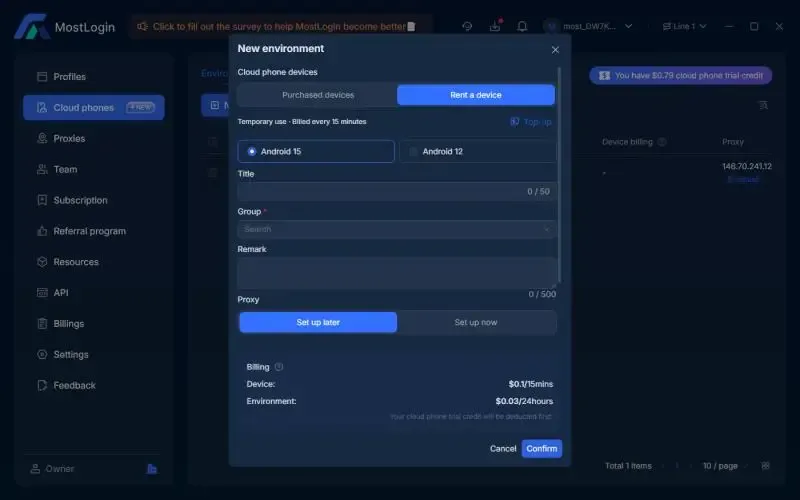With the boom in cross-border e-commerce, short video operations, automated scripting, and gaming scenarios, cloud mobile phones have become a core tool for many teams and individuals. Compared to physical phones, cloud mobile phones offer lower costs, more stable operation, and support features such as batch management, environment isolation, and 24/7 online availability.
In 2025, major cloud mobile phone platforms have successively upgraded their computing power, system stability, and security strategies. So, which cloud mobile phones on the market are worth choosing? This article will introduce the six major mainstream cloud mobile phones of 2025, their advantages, and how to select the right platform.
Selection Criteria
Before choosing a cloud mobile phone, we first need evaluation criteria:
1. Feature completeness: Support for automation, ROOT, ADB, etc.
2. Security: Account isolation, anti-detection features, and anti-blocking systems.
3. Functionality and stability: Hardware configuration, latency, and uptime directly affect user experience.
4. User reputation and support: Feedback from real users and quality of customer service.
The Six Major Cloud Phones of 2025
1. MostLogin Cloud Phone
As one of the most widely used cloud phone brands in 2025, MostLogin offers powerful functionality. Its core advantages lie in using real Android devices, featuring anti-detection mechanisms, supporting real environment simulation, multi-account management, and automated batch operations. With transparent pricing, the maximum charge per device per month is $25, offering exceptional value for money.
Application scenarios: Cross-border e-commerce, social media marketing, multi-platform advertising, etc.
Advantages: Stability, strong scalability, and powerful anti-blocking technology.

2. MOMO Cloud Phone
This is a Taiwan-based company focusing on enterprise testing and automation. Unlike many other products targeting gamers or casual users, it focuses more on B2B services.
Application scenarios: Enterprise automation, internal operation and maintenance.
Advantages: Strong professional testing capabilities.
Disadvantages: Limited appeal to individual users, mainly oriented toward enterprise clients.
3. BlueStacks X (Cloud)
BlueStacks has long been one of the most popular Android emulators. The X version migrates its functionality to the cloud, allowing instant gameplay in browsers without installation.
Application scenarios: Gaming and entertainment.
Advantages: Easy to use with a large global user base.
Disadvantages: Limited to gaming, lacking scalable enterprise-level features.
4. Redfinger Cloud Phone
Redfinger also has a certain reputation in the cloud phone field, with advantages in strong stability and low disconnection rates, making it suitable for users who need to run scripts for long periods, such as TikTok, Facebook, and Amazon teams.
Application scenarios: Cross-border operations, long-term game AFK (Away From Keyboard), resident script tasks, etc.
5. LDCloud
LDCloud originates from the LDPlayer team, so it offers excellent game compatibility and better support for multiple mobile game instances than most cloud phones.
Application scenarios: Game AFK, game testing, multi-game account management.
6. Tencent Cloud Phone
Leveraging Tencent's powerful cloud ecosystem, Tencent Cloud Phone provides a stable Android environment in the cloud. Its main advantage lies in tight integration with Tencent's gaming ecosystem, serving both individual and enterprise users. It is particularly suitable for mobile game automation and large-scale multi-instance scenarios.
Application scenarios: Multiple application instances, game farming, etc.
Advantages: Reliable infrastructure and strong ecosystem compatibility.
Disadvantages: More focused on the gaming sector, lacking advanced enterprise-level batch operation capabilities.
In-depth Comparison of Cloud Phones
| Cloud Phone | Performance & Stability | Feature Completeness | Security | Usability | User Reputation | Typical Use Cases | Rating |
|---|---|---|---|---|---|---|---|
| MostLogin Cloud Phone | ⭐⭐⭐⭐⭐ | ⭐⭐⭐⭐⭐ | ⭐⭐⭐⭐⭐ | ⭐⭐⭐⭐☆ | ⭐⭐⭐⭐⭐ | Cross-border e-commerce, social media matrix | 9.5 / 10 |
| MOMO Cloud Phone | ⭐⭐⭐⭐☆ | ⭐⭐⭐⭐ | ⭐⭐⭐⭐ | ⭐⭐⭐⭐ | ⭐⭐⭐⭐ | Enterprise automation | 8.2 / 10 |
| BlueStacks X | ⭐⭐⭐⭐ | ⭐⭐⭐ | ⭐⭐⭐ | ⭐⭐⭐⭐⭐ | ⭐⭐⭐⭐ | Cloud gaming | 7.8 / 10 |
| Redfinger Cloud Phone | ⭐⭐⭐⭐⭐ | ⭐⭐⭐⭐ | ⭐⭐⭐⭐ | ⭐⭐⭐⭐ | ⭐⭐⭐⭐ | Script AFK, cross-border operations | 8.7 / 10 |
| LDCloud | ⭐⭐⭐⭐ | ⭐⭐⭐⭐ | ⭐⭐⭐ | ⭐⭐⭐⭐ | ⭐⭐⭐⭐ | Mobile game AFK | 8.0 / 10 |
| Tencent Cloud Phone | ⭐⭐⭐⭐☆ | ⭐⭐⭐⭐ | ⭐⭐⭐⭐ | ⭐⭐⭐⭐ | ⭐⭐⭐⭐ | Mobile game automation | 8.3 / 10 |
How to Choose a Cloud Phone?
Different users have different needs for cloud phones, which can be considered based on specific requirements:
1. Valuing stability, security, and controllability
For most users, the biggest concerns with cloud phones are: disconnections, lag, unstable IPs, account association issues, etc.
Therefore, when choosing, pay attention to the following indicators:
Stability: Whether it can run 7*24 hours without disconnection
Security: Whether it has anti-detection mechanisms, IP management, and environment isolation
Performance controllability: Whether configurations can be adjusted, whether APIs are provided, and whether batch management is supported
For example:
MostLogin excels in account isolation security
Redfinger is known for its stability
Tencent Cloud Phone performs well in infrastructure
2. Clarify usage scenarios: AFK, cross-border, e-commerce, or gaming?
Cloud phones are not universal tools, and different brands have distinct focuses.
If you're engaged in cross-border social media marketing, advertising, or multi-account matrices, you'll need cloud phones with environment isolation, secure fingerprinting, and automation, such as MostLogin.
If you need enterprise testing or internal system verification, you can consider more specialized options like MOMO Cloud Phone.
If you mainly use it for script AFK or game testing, it's better to choose cloud phones with high stability and good game compatibility, such as LDCloud or Tencent Cloud Phone.
3. Choose the most suitable option based on budget and scale
Cloud phone prices range from a few dollars to dozens of dollars, with significant differences, so evaluation should consider budget and scale:
Individual users: Choose lightweight, moderately priced cloud phones.
Small teams: Prioritize products with multi-account management and automation support.
Large teams / Enterprise users: Need APIs, batch deployment, permission management, and device scalability
For example:
MostLogin's pricing model (maximum $25 per month) offers excellent value for teams.
MOMO is more suitable for enterprise payments
Conclusion
The six major cloud phones of 2025 each have their own characteristics, meeting different needs. Different fields and requirements are suited to different cloud phone services, with MostLogin being more suitable for e-commerce and marketing teams.
With its powerful performance, automation, and anti-detection features, MostLogin Cloud Phone stands out. If you want to expand your business safely and efficiently, consider the MostLogin Cloud Phone service.
🚀 2025 Best Cloud Phone - MostLogin
MostLogin Cloud Phone provides independently isolated mobile environments for secure and efficient management of multiple accounts.
For any questions, please refer to the official help documentation


